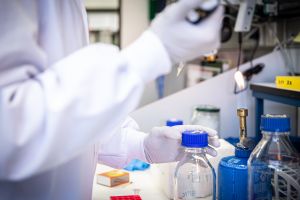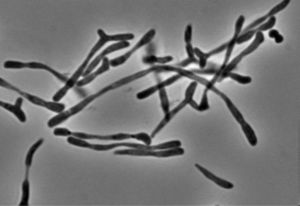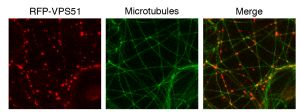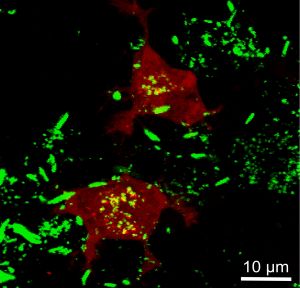
Identificado el mecanismo que emplea el virus de la gripe para provocar daño cardíaco
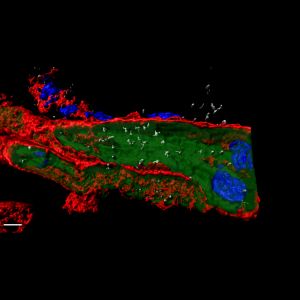
- El trabajo liderado por el CNB-CSIC muestra que la infección y replicación del virus en el corazón produce un fallo en la transmisión del impulso eléctrico cardiaco
- Un virus de la gripe más patogénico que otro atenuado permanece más tiempo en el corazón, de ahí que sea importante la detección temprana en pacientes con enfermedad cardíaca aguda
Un trabajo liderado por investigadores del Consejo Superior de Investigaciones Científicas (CSIC) y el Centro de Investigación Biomédica en Red de Enfermedades Respiratorias (CIBERES) ha descrito la fisiopatología cardíaca asociada a la infección por el virus de la gripe (especialmente en un virus muy patogénico en humanos), que puede derivar en muerte prematura. Los investigadores han mostrado que la infección y replicación del virus en el corazón produce un fallo en la transmisión del impulso eléctrico cardiaco, que puede desembocar en la muerte. Los resultados, publicados en Cardiovascular Research, destacan la potencial relevancia de la detección temprana del virus de la gripe en casos clínicos con daño cardíaco agudo durante las temporadas o brotes de gripe.
El trabajo, fruto de la colaboración con el Centro Nacional de Investigaciones Cardiovasculares (CNIC), el Centro de Investigación Biomédica en Red de Enfermedades Cardiovasculares (CIBERCV) y el Hospital Clínico San Carlos, ha evaluado los mecanismos relacionados con el daño cardiaco en la infección por el virus de la gripe in vivo en un modelo de ratón y en células musculares cardíacas derivadas de células humanas pluripotentes.
La galerista Helga de Alvear apoya con un millón de euros el trabajo del equipo del virólogo Luis Enjuanes en la investigación del Covid-19
A newly identified protein in Salmonella explains relapses following cephalosporin treatment
Identification of an organelle associated with microtubules in the plant vacuolar trafficking pathway
El CNB-CSIC acoge el criomicroscopio electrónico más avanzado de España
DGK ζ is key for the cellular flexibility of B lymphocytes to capture antigens
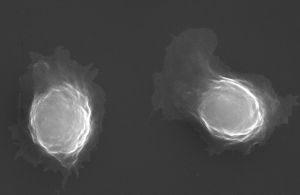
- Diacylglycerol kinases regulate the immune response mediated by B and T lymphocytes.
- The isoform DGK ζ is essential for the reorganization of the B cell cytoskeleton during the process of antigen capture, which is needed for antibody production and generation of memory cells that confer long-term immunity.
DGK (diacylglycerol kinases) are proteins known for their role as negative regulators of the immune response of B and T lymphocytes. For this reason, they are under study as therapeutic targets for the treatment of pathologies as cancer, pursuing to boost the immune response through their inhibition.
A study performed by Yolanda R. Carrasco´s group at the National Center of Biotechnology (CNB-CSIC) has revealed that the ζ isoform of the DGK also acts as a positive regulator of the B lymphocyte response. The results, recently published in Science Signaling, derive from a collaborative effort with the groups of Isabel Mérida at CNB-CSIC, Balbino Alarcón at CBMSO-CSIC-UAM and two groups of biophysics expertise leaded by Paolo Pierobon and Julien Husson at Institut Curie and Ecole Polytechnique in Paris, respectively.
Secuencias de A-tracts regulan el plegamiento del genoma mediante cambios en su flexibilidad
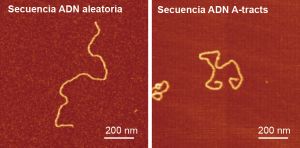
- Secuencias de A-tracts regulan el plegamiento del ADN en el núcleo de la célula
- La cantidad y la distribución de secuencias A-tracts determinan la flexibilidad del ADN
- Tecnologías de molécula única como la microscopía de fuerzas atómicas y las pinzas ópticas y magnéticas ayudan a descifrar las bases físico-químicas del ADN
En el interior del núcleo de la célula, el genoma se encuentra meticulosamente plegado, formando una compleja estructura tridimensional. El primer paso en este plegamiento es la formación de nucleosomas. Numerosos estudios han revelado que la distribución de nucleosomas está directamente codificada en las propiedades biofísicas del ADN. Secuencias más flexibles tienden a formar nucleosomas más estables mientras que secuencias rígidas tienden a estar desprovistas de nucleosomas. Las secuencias A-tracts consisten en cuatro o más bases de adeninas seguidas que juegan un papel esencial en la formación de nucleosomas. El nuevo artículo del grupo de Fernando Moreno-Herrero en el Centro Nacional de Biotecnología (CNB-CSIC) publicado en la revista Nucleic Acids Research aporta información sobre como funcionan estas secuencias.
Este estudio liderado por investigadores del CNB-CSIC ha demostrado que la flexibilidad de las secuencias A-tracts está regulada por el número y su distribución a lo largo del genoma. Moreno-Herrero, investigador principal del trabajo destaca: “hasta ahora se conocía la estructura y propiedades mecánicas de una secuencia A-tract aislada, sin embargo, se desconocía el efecto colectivo que su distribución podía tener en el plegamiento del ADN”. Alberto Marín-González, primer autor del trabajo indica: “hemos descubierto que la distribución periódica de secuencias A-tracts inducen un plegamiento en el ADN afectando su flexibilidad y esto explicaría los diferentes grados de afinidad de estas secuencias con los nucleosomas”.
Prion transmission is an evolutionary conserved mechanism
El CSIC recibe 350.000 euros del Grupo Catalana Occidente para contribuir a lograr una vacuna contra el SARS-CoV2
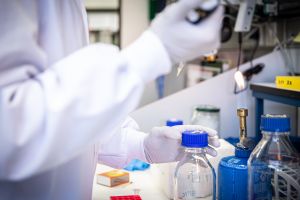
- La dotación financiará los proyectos del CNB-CSIC que buscan un candidato a vacuna para abordar la epidemia de Covid19 a través de la Fundación Jesús Serra.
El Consejo Superior de Investigaciones Científicas (CSIC) ha recibido 350.000 euros del Grupo Catalana Occidente, a través de su Fundación Jesús Serra, para potenciar los proyectos de investigación que buscan una vacuna contra el coronavirus SARS-CoV-2 que pueda proteger a la población frente a la infección.
La aportación está destinada a los grupos de investigación del Centro Nacional de Biotecnología (CNB-CSIC), que desde enero están liderando, en colaboración con otros grupos de investigación nacionales e internacionales, varios proyectos para conocer en detalle la estructura de este coronavirus, y abordar el desarrollo de candidatos a vacunas mediante edición genética.
El CNB recibe 180.000 euros de Club Madrid, con el apoyo de Kingold Group, para investigar la Covid-19
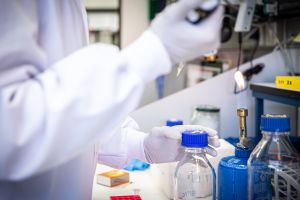
- El CNB-CSIC destinará la donación a financiar la contratación de personal y la adquisición de materiales de investigación
El Centro Nacional de Biotecnología (CNB-CSIC) del Consejo Superior de Investigaciones Científicas (CSIC) ha recibido 180.000 euros de la institución sin ánimo de lucro World Leadership Alliance-Club de Madrid, con el apoyo de Kingold Group, para impulsar las investigaciones en marcha sobre el coronavirus SARS-CoV-2, causante de la pandemia de Covid19. La donación irá destinada a contratar personal y material de investigación.
La presidenta del CSIC, Rosa Menéndez, ha agradecido la donación de Club Madrid porque “contribuirá a apoyar el avance de las líneas de investigación punteras del CNB-CSIC que estudian los coronavirus y que están trabajando en cooperación internacional para abordar la epidemia”.
El director del CNB-CSIC, Mario Mellado, ha destacado: “esta donación supone un fuerte impulso para los equipos del CNB-CSIC que están inmersos en el desarrollo de tratamientos y vacunas eficaces en este nuevo reto al que nos enfrentamos”.
La secretaria general de World Leadership Alliance-Club de Madrid, María Elena Agüero, señala: “ante la pandemia Covid19, Club de Madrid ha apostado por apoyar la ciencia y realizar una donación económica al CSIC para promover la investigación sobre el SARS-CoV-2 que permita la contratación de personal especializado y la adquisición de material y reactivos para el avance de las investigaciones sobre el coronavirus”.
COOKIES POLICY
A cookie is a text file that is stored on your computer or mobile device via a web server and only that server will be able to retrieve or read the contents of the cookie and allow the Web site remember browser preferences and navigate efficiently. Cookies make the interaction between the user and the website faster and easier.
General information
This Website uses cookies. Cookies are small text files generated by the web pages you visit, which contain the session data that can be useful later in the website. In this way this Web remembers information about your visit, which can facilitate your next visit and make the website more useful.
How do cookies?
Cookies can only store text, usually always anonymous and encrypted. No personal information is ever stored in a cookie, or can be associated with identified or identifiable person.
The data allow this website to keep your information between the pages, and also to discuss how to interact with the website. Cookies are safe because they can only store information that is put there by the browser, which is information the user entered in the browser or included in the page request. You can not run the code and can not be used to access your computer. If a website encrypts cookie data, only the website can read the information.
What types of cookies used?
The cookies used by this website can be distinguished by the following criteria:
1. Types of cookies as the entity that manages:
Depending on who the entity operating the computer or domain where cookies are sent and treat the data obtained, we can distinguish:
- Own cookies: are those that are sent to the user's terminal equipment from a computer or domain managed by the editor itself and from which provides the service requested by the user.
- Third party cookies: these are those that are sent to the user's terminal equipment from a machine or domain that is not managed by the publisher, but by another entity data is obtained through cookies.
In the event that the cookies are installed from a computer or domain managed by the editor itself but the information collected by these is managed by a third party can not be considered as party cookies.
2. Types of cookies as the length of time that remain active:
Depending on the length of time that remain active in the terminal equipment can be distinguished:
- Session cookies: cookies are a type designed to collect and store data while the user accesses a web page. Are usually used to store information that only worth preserving for the service requested by the user at any one time (eg a list of products purchased).
- Persistent cookies: cookies are a type of data which are stored in the terminal and can be accessed and treated for a period defined by the head of the cookie, and can range from a few minutes to several years.
3. Cookies types according to their purpose:
Depending on the purpose for which the data are processed through cookies, we can distinguish between:
- Technical cookies: these are those that allow the user to navigate through a web page or application platform and the use of different options or services it exist as, for example, control traffic and data communication, identify the session, access to restricted access parts, remember the elements of an order, make the buying process an order, make an application for registration or participation in an event, use security features while browsing store content for dissemination videos or sound or share content via social networks.
- Customization cookies: these are those that allow the user to access the service with some general characteristics based on a predefined set of criteria in the user terminal would eg language, the type of browser through which you access the service, the locale from which you access the service, etc.
- Analysis cookies: they are those that allow the responsible for them, monitoring and analyzing the behavior of users of the web sites that are linked. The information gathered through such cookies are used in measuring the activity of web sites, application or platform and for the profiling of user navigation of such sites, applications and platforms, in order to make improvements function data analysis how users use the service.
Management tool cookies
This Website uses Google Analytics.
Google Analytics is a free tool from Google that primarily allows website owners know how users interact with your website. Also, enable cookies in the domain of the site in which you are and uses a set of cookies called "__utma" and "__utmz" to collect information anonymously and reporting of website trends without identifying individual users..
For statistics of use of this website use cookies in order to know the level of recurrence of our visitors and more interesting content. This way we can concentrate our efforts on improving the most visited areas and make the user more easily find what they are looking for. On this site you can use the information from your visit for statistical evaluations and calculations anonymous data and to ensure the continuity of service or to make improvements to their websites. For more details, see the link below privacy policy [http://www.google.com/intl/en/policies/privacy/]
How to manage cookies on your computer: disabling and deleting cookies
All Internet browsers allow you to limit the behavior of a cookie or disable cookies within settings or browser settings. The steps for doing so are different for each browser, you can find instructions in the help menu of your browser.
If you decline the use of cookies, since it is possible thanks to the preferences menu of your browser or settings, reject, this website will continue to function properly without the use of the same.
Can you allow, block or delete cookies installed on your computer by setting your browser options installed on your computer:
- For more information about Internet Explorer click here.
- For more information on Chrome click here.
- For more information about Safari click here.
- For more information about Firefox click here.
Through your browser, you can also view the cookies that are on your computer, and delete them as you see fit. Cookies are text files, you can open and read the contents. The data within them is almost always encrypted with a numeric key corresponding to an Internet session so often has no meaning beyond the website who wrote it.
Informed consent
The use of this website on the other hand, implies that you paid your specific consent to the use of cookies, on the terms and conditions provided in this Cookies Policy, without prejudice to the measures of deactivation and removal of cookies that you can take, and mentioned in the previous section.

